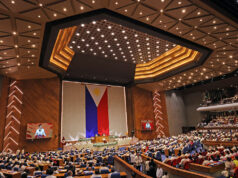Trade Tripper
Jemy Gatdula
Quite coincidentally, the news over the weekend just before President Duterte’s State of the Nation address was of positive economic news: lessened poverty (at least on the self-rated side), increased exports (due to rising global demand and lowered oil costs), and expected rise in GDP.
What is not seen, however, is how dependent (or vulnerable) the Philippines is on international developments, particularly with regard to trade.
Our competitiveness remains uncertain (improving, says the International Institute of Management Development; deteriorating says the World Economic Forum). Even then, most indicators point to a lowering of government efficiency, innovation, unhelpful tax rates, and quite medieval labor and business regulations.
That we don’t have a discernible trade policy, unless we consider going through the motions of trade negotiations and cultivating bureaucratese a policy, also indicates the lack of attention that the Duterte administration has with regard to international trade.
Nevertheless, it is with the international flow of goods and services that could facilitate whatever development program the present administration has.
Infrastructure projects need to be eventually paid, conditional cash transfers have to be funded, and even the extension of martial law in Mindanao must be accounted for economically; for which taxation and the domestic market alone cannot prop up.
Yet, while the rest of the world is also seemingly fired up by populist rhetoric, the actions on those foreign grounds are different: trade goes on.
And the Philippines is blissfully ignorantly out of it.
In China, the most public matter exemplifying its desire to plug in increasingly to the global trading system is the “new Silk Road.” The surface goal is to create a trade flow between Europe and China, which reportedly now has a trade value of $995 billion. Within a decade, with further developments on railroads, electric and oil lines, the value could increase to $2.5 trillion.
Europe has quietly gone along with China’s trade expansion, opening as it does further markets and lowered cost of goods moved due to improved transportation. And it would be welcome considering the uncertain future in trade relations that the EU has with the United Kingdom.
The Silk Road, is of course, a great idea. For China. How it benefits the Philippines is another matter.
Theoretically, it should provide us better access to EU and Russia but that would be dependent, obviously, on China’s benevolence.
The foregoing leaves us with our present trading partners South Korea and Japan: both of whom, in terms of percentage, we seem to have maxed out ceiling-wise in terms of trade.
Make no mistake, both are essential. But they are essential foundationally, in the sense that we need them while we simultaneously also do the necessary hunt for new and expanding markets elsewhere.
Of course, both have close relations with the United States.
Which leads us to the US. And Trump.
Donald Trump has been derided as a populist buffoon seeking to wreak havoc on global trade by pushing protectionist measures.
Now this is not meant as a defense of Donald Trump (heaven forbid) but the truth is, he is buffoonish insofar as he wants the US to do what the Europeans have been doing and the Philippines is aspiring verbally to do as well.
“America First” is no different from the trade policies of the EU, China, Japan, and South Korea. If Russia can be a big player aside from oil in relation to trade, it will certainly do the same. ASEAN is doing it, even that most cosmopolitan Singapore.
If the Philippines is wise, it will prioritize developing a Filipino-centric trade policy.
The fact is, there is a huge imbalance in international trade and most of the big players are causing it.
The US has, unfortunately, for the past decades or so, subsidized nonperforming countries for too long, causing deficits within its own budget. It also encouraged businesses to shift abroad to imprudent levels, draining considerable innovation and talent resource. The rise in entitlement spending, as well as bloated government, all have contributed to increasing inflation, making US products less competitive in the global market.
The other big players, China, South Korea, Japan, and the EU, on the other hand, boosted exports through subsidies. In the case of China, there are allegations of currency manipulation. Domestic spending has gone down as well, thus discouraging imports.
In short, Trump is pilloried for being protectionist in rhetoric but actually fairer trade in demands, the other countries — particularly the EU — have been pro-trade in rhetoric but quite mercantilist in policy.
Amidst all this, the Philippines is presently a paper boat floating at the tide’s mercy. A loud, blustering paper boat (that is, assuming metaphorical paper boats can speak). With three million overseas workers vulnerable in the US, Europe, and the Middle East, plus the millions of immigrants in those countries also contributing to the nation’s economy.
The ironic thing is: we can actually be more than a paper boat.
***
By the way, this is the last “Trade Tripper” column. Paraphrasing what business leader Montgomery Burns once said: In closing, gentle reader, I’d like to thank you. “What’s that?” you say? Me thanking you? No, it’s not a misprint, for you see, I enjoyed writing this column as much as you enjoyed reading it.
Jemy Gatdula is a Senior Fellow of the Philippine Council for Foreign Relations and a Philippine Judicial Academy law lecturer for constitutional philosophy and jurisprudence.
jemygatdula@yahoo.com
www.jemygatdula.blogspot.com
facebook.com/jemy.gatdula
Twitter @jemygatdula



